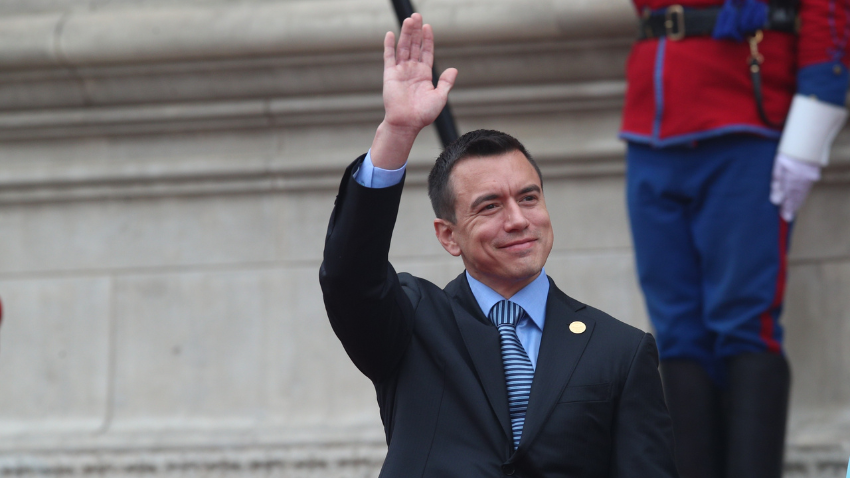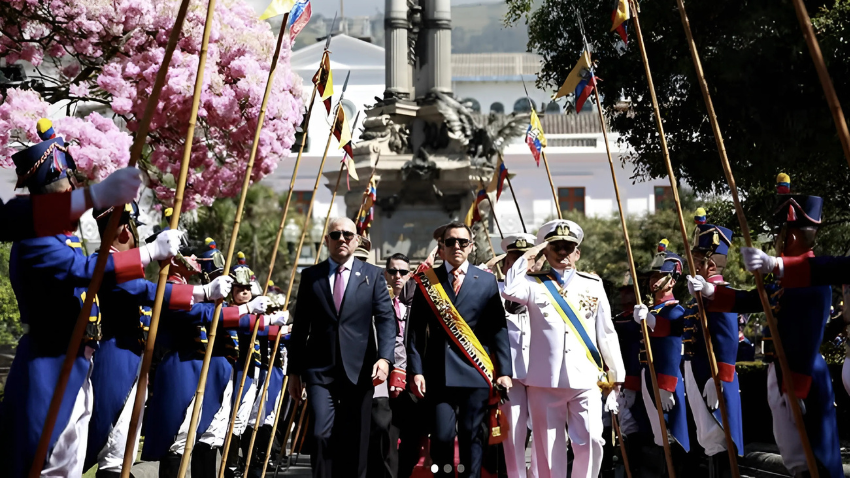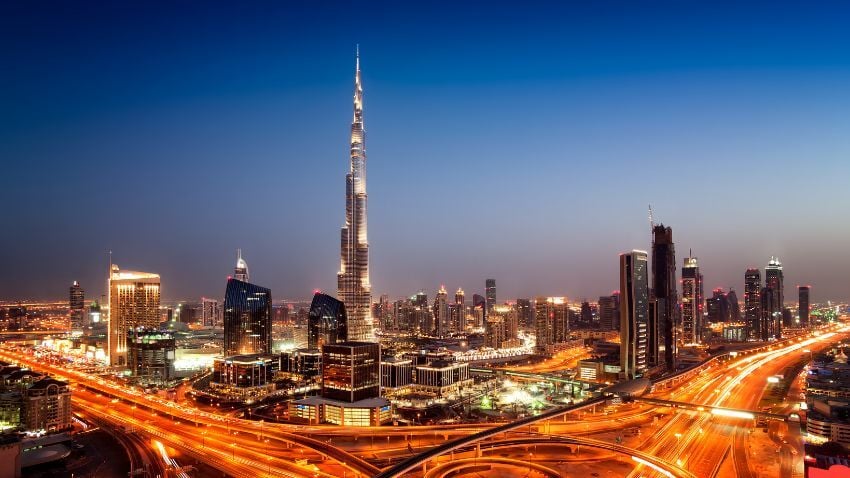Best Cities To Live In Mexico In 2026
Mexico remains one of Latin America’s most compelling destinations, especially for North Americans. More than a million expats call it home, and tens...

7 min read
Ecuador is a beautiful South American country with strong potential as an expat destination. Unfortunately, it has faced challenging times in the recent past due to organized crime, weakened political institutions, and a shrinking economy. Nevertheless, Ecuador’s current president may possess the determination and the authority to steer the country in a new direction.
Daniel Noboa, a billionaire from an old-money family, came to power in the midst of chaos as Ecuador's youngest-ever president. Although his rise in politics was unexpected, his determined stance on reforms as soon as he was elected president quickly changed people's opinion of him. Noboa has taken bold steps since taking office to confront organized crime, stabilize Ecuador's finances, and signal the world that the country is ready for a reset. He eventually won his second term in April 2025.
In this article, I'll explain who Noboa is, the challenges he inherited, and the policies he's already implemented. If you are an expat, a global investor, or exploring South America as part of your Plan-B strategy, it is worth following Ecuador's progress under Noboa's rule.

Daniel Noboa, son of a banana tycoon, rose from businessman to Ecuador’s youngest president. With calm leadership, he won two elections and reshaped the nation’s fight against crime and instability
Daniel Noboa was never an unknown, but his rise to the presidency still surprised Ecuador and the world. He was born into one of Ecuador's wealthiest families as the son of Álvaro Noboa, the banana tycoon. Daniel is not the first politician in his family. His father famously ran for president five times, but without success. Daniel, by contrast, stayed out of the spotlight for most of his early career. He studied at elite universities abroad, built his own ventures in logistics and commerce, and kept his distance from the fiery populism his father was known for.
He took his first real step into politics after being elected to the National Assembly in 2021. It was a quiet entry. He kept a low profile, steered clear of partisan battles, and built a reputation as a young, pragmatic centrist focused on economic issues. Nobody expected him to be a presidential frontrunner in just two years, but when President Guillermo Lasso triggered a snap election in 2023 to avoid impeachment, political coalitions shifted overnight.
Noboa formed an alliance called the National Democratic Action to enter the race with minimal name recognition. The early polls didn't even list him as a serious contender. However, his political chances took a turn after the assassination of Fernando Villavicencio, the anti-organized crime candidate. This political shock raised voters' demand for new, untainted leadership in the war against organized crime. Noboa's calm demeanour, business background, and promise of order and opportunity quickly gained traction. He secured second place in the first round, then defeated leftist candidate Luisa González in the runoff to become the youngest president in Ecuador’s history.
His first term was short, lasting just 18 months to complete Lasso's mandate. In that time, Noboa launched a full-scale war on organized crime, pushed through a constitutional referendum, and redefined Ecuador's political conversation around security, investment, and reform. When the regular 2025 general election arrived, he ran again against Luisa González and won a second term, defeating her by a 12-point margin.
To understand Daniel Noboa's presidency, you must understand the political mess he walked into. Ecuador was in big trouble when Noboa was elected president.
The political breakdown began in 2017, right after Rafael Correa's ten-year rule ended. His presidency, based on heavy socialist control and unchecked executive authority, left a state bloated with bureaucracy and corruption.
When his successor, Lenín Moreno, distanced himself from Correa's movement and shifted toward a more moderate course, the real machinery behind the chaos revealed itself. Correa's loyalists lost power and privilege and turned against Moreno. A spiral of sabotage, street protests, and endless power games dominated the political arena. Politicized institutions fell apart, and public trust in politics evaporated.
In the wake of this political showdown, Guillermo Lasso, a former banker who campaigned on free market promises, was elected president. However, he quickly disappointed those hoping for real reform. His administration drifted into compromise instead of cutting spending, shrinking government, or reining in corruption. He repeatedly backed down instead of pushing bold changes through executive authority. Meanwhile, debt ballooned, crime surged, and protests over fuel subsidies and economic frustration filled the streets. Lasso pressed the panic button and ended his presidency by invoking the muerte cruzada (mutual death clause) to dissolve parliament due to the threat of impeachment in 2023.
On top of the institutional crisis, Ecuador was facing an explosion of violence unlike anything in its modern history. Gangs took over prisons, began extorting money, and turned cities like Guayaquil into battlefields. Assassinations, bombings, and beheadings became regular news. The state lost control of entire regions.
The economy wasn't performing any better. Economic growth stagnated, unemployment was high, and public services suffered from underfunding. In addition to these economic problems, tax revenues continued to decline as the public debt ate up a large portion of them.
This was the Ecuador that Daniel Noboa inherited: a country with deteriorating political stability, a stagnating economy, and a massive rise in organized crime.

Daniel Noboa’s presidency has centred on a war against crime, raising taxes to fund security, pro-business policies, and a referendum that strengthened state power. Bold moves, but risks remain
Noboa has a lot on his plate. From the war on crime to institution building, a mountain of work awaits him in a not-so-friendly political environment. Let's look at the primary tasks Noboa is working on.
The focus of Daniel Noboa's presidency has been an all-out war on organized crime. Within weeks of taking office, he declared Ecuador to be in a state of "internal armed conflict". This was a legal designation that allowed him to deploy the military against the country's powerful drug cartels and prison gangs. He declared a state of emergency to suspend civil liberties, impose curfews, and militarize crime zones. These measures are highly controversial because of the limits they impose on civil liberties in Pacific provinces.
Noboa's approach has drawn obvious comparisons to El Salvador's Nayib Bukele's zero tolerance for crime. He ordered aggressive raids, mass arrests, and a military-led takeover of Ecuador's most dangerous prisons. Another notable action in the war against crime was Noboa’s order to raid the Mexican embassy and arrest former Vice President Jorge Glas, a convicted official with corruption charges related to Mexican drug cartels who had taken refuge in the embassy. The move was legally questionable and diplomatically explosive, but it reinforced a key part of Noboa's message: impunity is over even at the highest levels. Many citizens welcomed the show of strength.
Noboa hasn’t governed as a hardline conservative. In fact, he even raised the Value-Added Tax (VAT) from 12% to 15% in response to a budget crisis and the growing costs of his security measures. Like me, many Ecuadorians resented the tax hikes. Still, Noboa defended the increase as a necessary step to stabilize public finances and to fund the fight against organized crime.
Alongside the tax increase, Noboa positioned himself as pro-investment and pro-business, although structural reforms such as regulatory simplification or major infrastructure projects will inevitably take time to materialize.
While his administration has shown urgency on the fiscal side, long-term reforms to improve Ecuador's investment climate and economic competitiveness remain a work in progress.
By early 2024, Daniel Noboa faced a chronic problem in Ecuadorian politics: the broken legislature was incapable of producing meaningful reforms. Despite his electoral mandate and the urgency of the national crisis, the National Assembly remained fragmented, slow-moving, and dominated by partisan deadlock. Noboa turned to the only tool that still worked: the popular will.
In April 2024, Noboa asked voters to directly approve a package of eleven reforms aimed at restoring security, reinforcing justice, and unblocking key institutional barriers. Nine reforms were passed with strong support, including provisions that expanded the military's role in internal security, allowed quicker judicial processes for violent crimes, and strengthened the executive's hand in coordinating the state's response to organized crime.
The referendum gave him what he needed: the legal and political backing to act. It was a reset, not of democracy but of the state's ability to function. While there's always a risk when executive power expands, there's a far greater risk in doing nothing while criminal organizations fill the vacuum.

Ecuador under Noboa offers investor tax breaks, varied visa options, and affordable residency. Challenges remain, but with stability, it could become South America’s next expat hotspot
Since being re-elected in 2025, Noboa has not changed his political message: create jobs, attract investment, restore public trust, and eliminate organized crime. He has also emphasized modernizing infrastructure, improving education, and the long-overdue reformation of the judicial system. He has outlined a vision for a more dynamic, opportunity-driven economy.
The road ahead will not be easy in a country where every reform demands a battle against entrenched resistance. Noboa's party does not hold a majority, and much of the opposition remains hostile, especially after the diplomatic fallout from the Mexican embassy raid and the aggressive security crackdowns.
From an investor and expat perspective, Ecuador has a lot to offer. The country is not yet a top-tier expat destination, but it has some attractive policies for those looking to invest or relocate. The country provides tax breaks for foreign investment in priority sectors such as renewable energy, agro-industry, tourism, logistics, and technology. Qualified projects may benefit from income tax exemptions for up to 12 years, depending on the region and industry. There is also a VAT refund on capital goods and accelerated depreciation for productive assets.
Ecuador offers several visa options for expats, including:
Investor Visa: Requires a minimum investment of approximately $47,000 USD in real estate or a local business.
Pensioner Visa: Ideal for retirees with a guaranteed monthly income (e.g., from a pension) of at least $1410 USD.
Professional Visa: For degree-holders with job offers or remote workers who meet income and documentation requirements.
Rentista Visa: For those with passive income (e.g., from abroad) who meet a monthly threshold.
Residency is relatively affordable and accessible, and permanent residency is available after 21 months of holding a temporary visa.
Despite recent setbacks, Ecuador still has great potential to become a hotspot expat destination. If political and economic stability can be restored, Ecuador could have a better chance of becoming one of South America's most favoured expat destinations.

Noboa’s bold actions could reshape Ecuador, but only results will tell. If he sustains security and reforms, the nation may become fertile ground for freedom, opportunity, and investment
Daniel Noboa has taken bold steps where others hesitated, and for the first time in years, Ecuador has a leader who isn't afraid to act. In the end, results, not speeches, will determine whether his presidency marks a real turning point.
Of course, it is too early to draw a conclusion about Ecuador, as we need time to see how things unfold. If Noboa can maintain control over security, push through key reforms, and build investor confidence, he may lay the foundation for a more stable, prosperous Ecuador. We’ll be watching closely. The next few years will demonstrate whether Ecuador can truly become a place where freedom, opportunity, and investment can take root.
Waiting for politics to improve in your home country is not an option if you’re focused on wealth and freedom. Consider building your Plan-B before it’s too late. Take the first step by downloading our free Plan-B Residencies & Instant Citizenships report.
If you want the best intel from the expat world, including profitable offshore opportunities, little-known tax-saving strategies, and hard-won insights on immigration, passports, and Plan-B residencies, all delivered to your inbox every single week, then join our daily correspondence, EMS Pulse®. Currently enjoyed by over 84,000 expats and expat-hopefuls worldwide. Fill in the form below to join our newsletter free:

Written by Mikkel Thorup
Mikkel Thorup is the world’s most sought-after expat consultant. He focuses on helping high-net-worth private clients to legally mitigate tax liabilities, obtain a second residency and citizenship, and assemble a portfolio of foreign investments including international real estate, timber plantations, agricultural land and other hard-money tangible assets. Mikkel is the Founder and CEO at Expat Money®, a private consulting firm started in 2017. He hosts the popular weekly podcast, the Expat Money Show, and wrote the definitive #1-Best Selling book Expat Secrets - How To Pay Zero Taxes, Live Overseas And Make Giant Piles Of Money, and his second book: Expats Guide On Moving To Mexico.

Mexico remains one of Latin America’s most compelling destinations, especially for North Americans. More than a million expats call it home, and tens...

South Korea is far more than K-pop and K-dramas. It is a country known for outstanding food, from bustling street markets to high-end dining, as well...

Asia is one of the most fascinating regions in the world for travel, offering an extraordinary mix of cultures, histories, and landscapes. From...